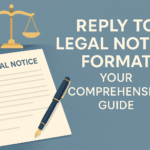Picture this: You’ve been trying to send a legal notice to someone, but they keep evading the courier service and changing addresses. Meanwhile, they’re active on WhatsApp daily, posting stories and responding to messages. Can you send your legal notice through WhatsApp instead?
In India’s rapidly digitizing legal landscape, courts have begun recognizing electronic modes of communication for legal notices. With traditional postal services often causing delays and parties intentionally avoiding physical delivery, this question has become increasingly relevant. This comprehensive guide explores the legal validity, requirements, court decisions, and practical considerations for sending legal notices through WhatsApp in India.
Table of Contents
Understanding Legal Notices in the Digital Age
A legal notice is a formal written communication informing another party of a grievance or intention to initiate legal proceedings. Traditionally, legal notices for contract breach were sent through registered post or courier services. However, the purpose is simple: bring a matter to the other party’s attention and provide response opportunity before litigation. The Indian legal system has evolved to embrace digital communication, recognizing that justice shouldn’t be delayed due to outdated delivery mechanisms.
Legal Framework Supporting Electronic Legal Notices
Information Technology Act, 2000
The cornerstone of electronic communication validity in India is the Information Technology Act, 2000. Section 4 of the IT Act grants electronic records the same legal status as paper documents, provided they’re accessible for future reference. Section 5 extends similar recognition to electronic signatures, equating them with handwritten signatures for authentication purposes.
Sections 11, 12, and 13 govern attribution, acknowledgment, and dispatch of electronic records. These provisions clarify that electronic messages are deemed dispatched when they enter a computer resource outside the sender’s control—for WhatsApp, when the message successfully leaves your device.
Bharatiya Sakshya Adhiniyam, 2023
Section 61 of the new evidence law maintains that electronic records like WhatsApp messages are admissible in court with proper certification. When you send a legal notice for recovery of money through WhatsApp, the message can serve as valid evidence if you prove authenticity and delivery.
Code of Civil Procedure
Order V Rules 9 and 9A give courts discretion to permit service through electronic means when traditional methods prove ineffective. High Courts like Bombay have formulated specific rules for electronic service in commercial disputes.
Key Court Decisions on WhatsApp Legal Notices
Indian courts have progressively accepted WhatsApp service. The Bombay High Court held that double blue ticks constitute prima facie evidence that notices reached and were accessed by recipients. The court emphasized that blue ticks demonstrate message delivery and opening.
Delhi courts permitted service through WhatsApp in time-sensitive matters. The Rohini Civil Court accepted blue double-ticks as valid proof, using color printouts of chats as service evidence.
During the 2020 lockdown, the Supreme Court permitted service through instant messaging including WhatsApp, Telegram, and Signal. The Court directed simultaneous email service when using messaging platforms. However, recent decisions note WhatsApp may not be accepted at certain procedural stages under specific court rules.
Consumer forums have also recognized WhatsApp as valid service when traditional methods fail, referencing Section 65 of the Consumer Protection Act, 2019.
Essential Requirements for Valid WhatsApp Legal Notices
Proof of Delivery
The most critical requirement is demonstrating the notice reached the intended recipient. For WhatsApp, proof comes through delivery indicators:
- Single Grey Tick: Message sent but not delivered—insufficient proof
- Double Grey Ticks: Delivered to recipient’s device—shows receipt but not access
- Double Blue Ticks: Message read by recipient—strongest indicator courts seek
Take timestamped screenshots showing these indicators. However, disabled read receipts create difficulties in establishing whether messages were seen.
Proper Documentation
Maintain comprehensive documentation including:
- Full screenshots showing recipient’s number or contact name
- Timestamps of when notice was sent and delivered
- Complete text or PDF attachment showing it was opened
- Any responses from the recipient
- Evidence linking the WhatsApp number to the intended recipient
Certification Under Section 61
Electronic records should ideally be accompanied by certification under Section 61 of the Bharatiya Sakshya Adhiniyam, authenticating the electronic record and establishing its integrity.
Correct Recipient Identification
Proving the WhatsApp number belongs to the intended recipient is critical. Maintain evidence such as previous communications, publicly listed numbers, profile information matching their identity, or official documents showing the number.
Proper Format and Content
The notice must meet all standard legal requirements regardless of delivery medium, including clear identification of parties, detailed grievance description, legal basis, specific relief sought, reasonable response time, and warning of intended legal action. Send as a PDF attachment on official letterhead with digital signatures.
Advantages of WhatsApp Legal Notices
Speed and Immediacy: Instant delivery compared to days or weeks for registered post, valuable in time-sensitive matters.
Cost-Effectiveness: Eliminates courier charges and postal fees, making legal recourse more accessible.
Trackability: Real-time delivery confirmation with automatic timestamps creating clear communication records.
Difficulty in Avoiding Service: Much harder for recipients to claim non-receipt compared to claiming absence during courier delivery.
Limitations and Challenges
Disabled Read Receipts: Cannot obtain blue ticks when recipients turn off read receipts, posing challenges in proving message reading.
Authentication Concerns: Courts may demand strict authentication verifying the number belongs to the recipient and screenshots haven’t been manipulated.
Jurisdictional Variations: Not all courts have consistent rules for accepting electronic service; some insist on traditional methods.
Limited Criminal Case Acceptance: Criminal proceedings often require stricter statutory compliance; WhatsApp may not be valid in all criminal matters.
Specific Statutory Requirements: Certain statutes mandate particular service modes that WhatsApp alone may not satisfy.
Best Practices for WhatsApp Legal Notices
Use Dual-Mode Service: Send simultaneously through WhatsApp and email following Supreme Court guidance for redundancy and additional proof.
Maintain Comprehensive Records: Create complete digital records including screenshots with full message threads, recipient’s profile and activity evidence, original notice PDF, and any responses.
Send as PDF Attachment: Use proper letterhead with lawyer’s details and signature rather than typing directly in chat.
Follow Up Traditionally: Consider following up with notice to tenant through registered post for additional proof.
Document Activity: Screenshot recipient’s WhatsApp activity around notice time—last seen status or story updates strengthen your case.
Obtain Legal Advice: Consult lawyers familiar with specific requirements of your case type and jurisdiction before relying solely on WhatsApp service.
Key Takeaways
- Indian courts have established that WhatsApp notices can be valid when properly documented with delivery and reading proof
- Double blue ticks are the gold standard for proving receipt and access
- Dual-mode service through both WhatsApp and email simultaneously provides stronger evidence
- WhatsApp service isn’t appropriate for all case types—criminal proceedings may need traditional methods
- Comprehensive documentation is critical: take screenshots, maintain original evidence, and consider Section 61 certification
- Different courts and proceeding stages may have varying acceptance levels for electronic service
Frequently Asked Questions
Can WhatsApp blue ticks be considered legal proof of delivery?
Yes, courts have recognized blue ticks as prima facie evidence of both delivery and reading. They indicate the message reached the recipient’s device and was opened. However, this proof can be challenged if read receipts were disabled or if the recipient disputes number ownership. Combine blue tick screenshots with additional evidence linking the number to the recipient for maximum strength.
Is email better than WhatsApp for sending legal notices?
Email offers advantages including detailed delivery logs, server-generated confirmation, and less vulnerability to disabled read receipts. However, WhatsApp has instant delivery indicators and is harder for recipients to claim they don’t regularly check. The Supreme Court’s approach of using both methods simultaneously provides the best combination of benefits.
What should I do if the recipient has disabled read receipts?
Document other evidence of delivery and account activity, such as “last seen” status, profile picture updates, or status posts around notice time. Consider also sending through email and traditional post to ensure comprehensive documentation of service attempts.
Are WhatsApp legal notices valid in all types of cases?
No, validity varies by case type and jurisdiction. WhatsApp notices have greater acceptance in civil matters, commercial disputes, and consumer cases. Criminal proceedings often require stricter procedural adherence, and some courts may not accept electronic service at certain stages. Specific statutes may mandate particular service modes that WhatsApp alone cannot satisfy. Always consult a lawyer about your specific case requirements.
How long should I wait for a response after sending a WhatsApp legal notice?
Provide the same reasonable response time as traditionally served notices—typically 7 to 30 days depending on matter nature and urgency. The response period should be clearly stated in your notice. Despite instant WhatsApp delivery, recipients still need adequate time to seek legal advice and formulate responses.
Do I need a lawyer to send a legal notice through WhatsApp?
While you can technically send a notice yourself, having a lawyer provides several advantages. A lawyer ensures the notice meets all legal requirements, uses appropriate legal language, includes proper citations, and maintains professional format. Moreover, notices on lawyer’s letterhead carry more weight and signal seriousness about pursuing legal action. The lawyer can also advise whether WhatsApp service is appropriate for your specific situation.
Can recipients claim they didn’t see the message even with blue ticks?
While blue ticks indicate message opening, recipients might claim someone else accessed their phone. Comprehensive documentation is crucial—take screenshots showing the complete message thread, recipient’s profile information, and recent WhatsApp activity to make denials less credible.
When is WhatsApp service particularly useful?
WhatsApp service is especially valuable for urgent interim relief matters requiring immediate intervention, overseas recipients where international courier is expensive and slow, recipients deliberately avoiding traditional service by changing addresses, commercial disputes where parties regularly exchange WhatsApp messages, and cases under the Consumer Protection Act which specifically recognizes electronic service.
Conclusion
Indian courts have accepted that legal notices can be effectively served through WhatsApp when properly documented. While this comes with caveats regarding proof and jurisdictional variations, digital platforms have become legitimate tools for expediting justice. The key lies in understanding advantages and limitations, following documentation best practices, and knowing when traditional methods remain necessary. As India’s legal system continues its digital transformation, WhatsApp represents a valuable addition to ensure access to justice.
StrictlyLegal provides comprehensive guidance on Indian law. Whether navigating legal notices, understanding rights, or exploring legal careers, our resources help you make informed decisions.

Passionate about using the law to make a difference in people’s lives. An Advocate by profession.




